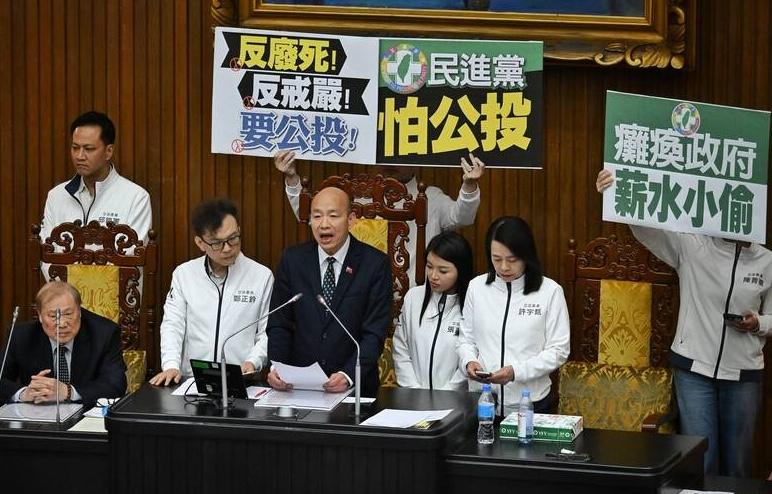The legislature yesterday passed a motion sending two Chinese Nationalist Party (KMT) referendum proposals on "opposing the abolition of the death penalty" and "opposing martial law" to a second reading without the need for committee review, after a contentious session marked by protests and parliamentary maneuvering.
The motion was supported by lawmakers from the KMT and the Taiwan People's Party (TPP), with Democratic Progressive Party (DPP) lawmakers voting against.

Photo: Chen Yi-kuan, Taipei Times
The motion brings closer the possibility that voters would be asked in a national referendum their views on capital punishment, which is legal in Taiwan although rarely enforced, and "martial law," which brings to mind the 38-year period of authoritarian rule prior to Taiwan's democratization beginning in the 1980s.
The "opposing the abolition of the death penalty" referendum proposal would ask voters: "Do you agree with the policy that judges in appellate courts do not need unanimous agreement to sentence a defendant to the death penalty?"
The "opposing martial law" referendum proposal would ask: "Do you agree the government should avoid war and prevent Taiwan from becoming a place of martial law, where youth die and homes are destroyed, as in Ukraine?"
In practice, the referendum questions have questionable significance, as the government led by the DPP does not formally support abolishing the death penalty, nor does it support imposing martial law.
On Friday last week, Central Election Commission Chairman Lee Chin-yung (李進勇) said that the opposition parties' proposed referendum questions "would have no effect even if passed," as they ask the government not to implement a policy that the government does not advocate.
Earlier yesterday, DPP lawmakers caused a halt in proceedings when they occupied the podium and prevented any discussion of the proposed referendums, which prompted Legislative Speaker Han Kuo-yu (韓國瑜) to suspend the meeting.
At about 6pm, when the legislative session was scheduled to end, the DPP lawmakers withdrew from the podium.
However, the speaker returned and announced the meeting would continue at 7:20pm.
DPP Legislator Wu Szu-yao (吳思瑤) and other lawmakers protested by holding placards and shouting "illegal meeting," while DPP caucus whip Ker Chien-ming (柯建銘) repeatedly struck his desk with a cane in an attempt to disrupt the vote.
Despite the protests, the KMT and TPP passed the two referendum proposals to a direct second reading through a vote, bypassing the committee review stage.

Taiwan has received more than US$70 million in royalties as of the end of last year from developing the F-16V jet as countries worldwide purchase or upgrade to this popular model, government and military officials said on Saturday. Taiwan funded the development of the F-16V jet and ended up the sole investor as other countries withdrew from the program. Now the F-16V is increasingly popular and countries must pay Taiwan a percentage in royalties when they purchase new F-16V aircraft or upgrade older F-16 models. The next five years are expected to be the peak for these royalties, with Taiwan potentially earning

STAY IN YOUR LANE: As the US and Israel attack Iran, the ministry has warned China not to overstep by including Taiwanese citizens in its evacuation orders The Ministry of Foreign Affairs (MOFA) yesterday rebuked a statement by China’s embassy in Israel that it would evacuate Taiwanese holders of Chinese travel documents from Israel amid the latter’s escalating conflict with Iran. Tensions have risen across the Middle East in the wake of US and Israeli airstrikes on Iran beginning Saturday. China subsequently issued an evacuation notice for its citizens. In a news release, the Chinese embassy in Israel said holders of “Taiwan compatriot permits (台胞證)” issued to Taiwanese nationals by Chinese authorities for travel to China — could register for evacuation to Egypt. In Taipei, the ministry yesterday said Taiwan

‘LIKE-MINDED PARTNER’: Tako van Popta said it would be inappropriate to delay signing the deal with Taiwan because of China, adding he would promote the issue Canadian senators have stressed Taiwan’s importance for international trade and expressed enthusiasm for ensuring the Taiwan-Canada trade cooperation framework agreement is implemented this year. Representative to Canada Harry Tseng (曾厚仁) in an interview with the Central News Agency (CNA) said he was increasingly uneasy about Ottawa’s delays in signing the agreement, especially as Ottawa has warmed toward Beijing. There are “no negotiations left. Not only [is it] initialed, we have three versions of the text ready: English, French and Mandarin,” Tseng said. “That tells you how close we are to the final signature.” Tseng said that he hoped Canadian Prime Minister Mark Carney

POSITIVE DEVELOPMENT: Japan and the US are expected to hold in-depth discussions on Taiwan-related issues during the meeting next month, Japanese sources said The holding of a Japan-US leaders’ meeting ahead of US President Donald Trump’s visit to China is positive news for Taiwan, former Japan-Taiwan Exchange Association representative Hiroyasu Izumi said yesterday. After the Liberal Democratic Party’s landslide victory in Japan’s House of Representatives election, Japanese Prime Minister Sanae Takaichi is scheduled to visit the US next month, where she is to meet with Trump ahead of the US president’s planned visit to China from March 31 to April 2 for a meeting with Chinese President Xi Jinping (習近平). Japan and the US are expected to hold in-depth discussions on Taiwan-related issues during the